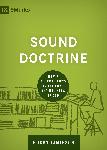Ours is not the first generation to express distaste for doctrine. That’s an old problem. Warfield lamented the “doctrinal indifferentism” of his day, and the apostle Paul warned of it long before him. I will be the first to admit that often it’s the preacher at fault, however astonishing it is that boring could ever rightly be used to modify words like gospel and preaching and doctrine. Some of the blame lies with at least some preachers. But to be fair, some of the blame belongs to hearers with lazy minds also, and with hearers who are more concerned with themselves and life-tips than they are with the glories of the eternal God.
We don’t need here to try sorting out who is more to blame, and of course situations vary. There are faithful pastors whose people just don’t want doctrine, and there are faithful church members who would give their right arm for a pastor who would teach them better.
Yet it remains that the distinctive of Christianity is that it is the revealed religion, and the church therefore, the pillar and ground of the truth, has before all else a message to proclaim. And that message is in fact the means by which God claims and transforms his people. And Christians of every generation need reminding of the fundamental need and the surpassing value of what the apostle Paul called sound doctrine.
This is the purpose of Bobby Jamieson’s newest addition to 9Marks’ growing series of small-book resources, Building Healthy Churches. In Sound Doctrine: How a Church Grows in the Love and Holiness of God, Jamieson explains that sound doctrine is practically valuable both for the individual Christian and the church. It is doctrine that establishes the church and its life.
In the first two chapters Jamieson seeks to establish the rightful place of doctrine in the church. He does not write for the academy but for the church and for the layman in particular. And so this is not theological prolegomena but an entry-level presentation of the fundamental role doctrine occupies in the life of the church. He writes with an engaging, conversational tone, and in the following chapters he demonstrates how doctrine shapes a church’s life in holiness, love, unity, worship, witness, and joy. The chapter on love is particularly effective, but in each chapter he makes his point winsomely clear.
I suspect that the net effect of this book for church members who read it will be an increased appreciation of the value of biblical teaching – a mark of a healthy church indeed. We continue to be thankful for the strategic ministry God has given 9Marks.
Fred G. Zaspel
